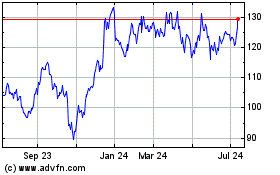By Peter Grant
This article is being republished as part of our daily
reproduction of WSJ.com articles that also appeared in the U.S.
print edition of The Wall Street Journal (November 6, 2019).
Two of the world's biggest real-estate owners are racing to
dominate in the business of offering ever-faster e-commerce
delivery.
Prologis Inc., a logistics company with $111 billion of assets
under management, and the giant investment firm Blackstone Group
Inc. are betting that supply chains operated by Amazon.com, Walmart
Inc. and other retailers will keep pressing for greater speed, more
choices and more convenience.
Prologis last week announced plans to acquire Liberty Property
Trust, an owner of industrial space, for about $12.6 billion
including debt. The deal would help Prologis maintain its status as
the country's largest supply chain owner, with 572 million square
feet of space in the U.S. after the transaction and another
acquisition close in 2020.
Close behind is Blackstone, which manages over $250 billion
worth of property globally and has made logistics a priority. In
September, the firm closed on the purchase of a portfolio with 179
million square feet from Singapore-based GLP and announced plans to
buy 60 million square feet from Colony Capital Inc. Blackstone's
total after the Colony deal closes would put it in control of 443
million square feet.
Together, the two heavyweights would control about 10% of the
U.S. logistics space market when their recent deals close. Other
major players in the business include the real-estate investment
trusts Duke Realty and Cole Real Estate Investments Inc. as well as
the investment firm Clarion Partners.
Their bets reflect a transformation taking place in the
once-sleepy industrial- property sector. Before the days of online
shopping, supply chains consisted mostly of warehouses and
distribution centers far away from cities for manufactured goods
awaiting transportation to malls and other bricks-and-mortar retail
locations.
Today, with retailers and distribution companies offering
millions of consumers next-day delivery, supply chains are
expanding to include thousands of new industrial properties closer
to population centers. This is greatly amping up demand because the
closer supply chains get to homes, the more space they need.
The economics work for merchants because they are trading in
more expensive bricks-and-mortar retail space.
"Rents for industrial can be $5 a square foot," said Thomas
Catherwood, a REIT analyst at BTIG LLC. "Even if you're paying
three times that, you're still not paying $75 to $100 a square foot
to be in the Short Hills mall," he said, referring to a popular
shopping destination in New Jersey.
The flood of new capital will likely increase the efficiency of
these new supply chains, reducing costs for shippers and retailers.
The top 50 markets now have more than 14 billion square feet of
space, according to Green Street Advisors.
"The more investment dollars going into industrial real estate,
the lower your supply chain costs will eventually be over the long
run," said Eric Frankel, a Green Street analyst.
For investors, industrial real estate has been a bonanza for
most of the recovery. Prologis's shares, which fell to below $10
during the depths of the financial crisis, hit their record high of
over $92 last month.
Earlier in the recovery, Blackstone sold IndCor Properties Inc.
for $8.1 billion. The firm sold its European portfolio to the
sovereign-wealth fund China Investment Corp. for about $14
billion.
Buying property today is more expensive, as values have more
than doubled since they hit bottom in 2009, according to a Green
Street index that tracks the sector.
Moreover, as delivery times increasingly determine success, the
battle of landlords is shifting deeper into city centers. This
development is tricky in cities where "last mile" industrial
properties, referring to the final segment of a product's journey
from manufacturer to customer, are either spoken for or have been
converted into other uses, such as loft condos.
"There is no perfect building in the perfect location that's
going to be the perfect last mile building in these major
metropolitan areas," said Hamid Moghadam, Prologis's chief
executive, in an interview Monday. He noted that the company is
dealing with this challenge partly by developing over $3 billion of
real estate annually.
Blackstone, which recently launched its Link Industrial
Properties operating brand, is developing a few small properties
known as infill in high-growth urban markets including Seattle,
Miami and Los Angeles. Its investment strategy is also focusing
heavily on infill.
"You're seeing an evolution in the logistics space with an
ever-increasing focus on warehouses near population density," said
Nadeem Meghji, Blackstone's head of real estate for the Americas,
in an email.
But investing in development and paying higher prices for
property depend heavily on the ability of landlords to keep raising
rents. Rents have increased 5.7% year-over-year since 2012,
according to CBRE.
Big industrial property investors believe they can keep
increasing rents partly because they can offer occupants
multilocation deals to meet their supply chain needs. Link
Industrial has 250 employees in the U.S. and 13 offices "whose sole
focus is operating our national infill warehouse business," Mr.
Meghji said.
Write to Peter Grant at peter.grant@wsj.com
(END) Dow Jones Newswires
November 06, 2019 02:47 ET (07:47 GMT)
Copyright (c) 2019 Dow Jones & Company, Inc.
Blackstone (NYSE:BX)
Historical Stock Chart
From Mar 2024 to Apr 2024

Blackstone (NYSE:BX)
Historical Stock Chart
From Apr 2023 to Apr 2024
